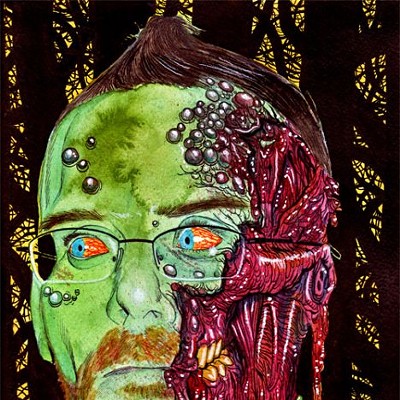Red Moon hits bookstore shelves Tuesday, May 7, and Percy will be in town to read from and sign the book Wednesday, May 8 at the Tattered Cover Colfax. In advance of the appearance, we talked to Percy about the book, his fusion of literary and genre tropes, and why he finds werewolves to be such compelling creatures.
See also: - The werewolf apocalypse kicks off in Travis Heermann's The Wild Boys - Christopher Leppek and Emanuel Isler talkAbattoir and what makes great horror - Corporate America meets the undead in Dave Flomberg's Management for Zombies
Westword:Give us a quick overview of what readers can expect from Red Moon.
Benjamin Percy: Some of my favorite horror stories, some of the most lasting horror stories, channel cultural unease. Look at the way Frankenstein is born out of the Industrial Revolution, look at the way that the Red Scare gave way to Invasion of the Body Snatchers. So when I sat down to write this novel, I thought about what we feared presently. I wanted to take a knife to the nerve of the moment. So this is a story that braids together our fear of terrorism and disease.
It's about an animal-born pathogen that I call Lobos, which is the equivalent of mad cow disease, or chronic wasting disease, except it come out of the wolf population and mutates in its human host. This happens in prehistoric times and if you fast forward to today, 10 percent of the population is infected and they're treated as second-hand citizens -- marginalized, unable to hold certain jobs or have certain rights. So they are in a state of resistance, battling back, and in response to a terrorist cell, the government cracks down on this segment of the population and everything rolls out of control. It is sort of a post-9/11 reinvention of the werewolf myth in that way, with a concern for the slippery science behind this disease in order to make the supernatural seem like a possibility -- a believable horror.
So your supernatural beasts aren't magic, they're more science-fictional?
Correct. I spent a lot of time sitting down with the USDA labs and researchers at Iowa State University, in order to figure out a believable way to conceive of this disease, one that affects the mind and is very much connected to rage and sexual impulse. So it is really no different than a Doctor Jekyll and Mr. Hyde scenario, where the id is unleashed.
Rage and sexual impulse have always been at the heart of the werewolf myth. Is it fair to say you've made an effort to remain true to the roots of the genre, while giving it your own spin?
The new spin is especially allegorical, in the way that it's about xenophobia. It's about the other. Of course, while giving a nod to the tried-and-true tropes of the werewolf myth that we're all familiar with.
Is that what drew you to werewolves? Is it an especially apt metaphor for xenophobia, for alienated populations?It is especially apt. This book has been a long time coming. I recently moved to Minnesota and while doing so was pawing through some old boxes. I came across an old "research paper" -- I wrote it in sixth grade -- and the title was "Werewolves!" It had a table of contents, even though it was only five pages long, and the final section concerned the "Ceremony of the Wolf." I actually, under a full moon, in my back yard, attempted to follow the instructions from an old book I found at the library and tried to transform myself. So the werewolf has always been my favorite monster.
This is your second published novel, right?
It is, though I have written many more that have never made it outside of my computer's hard drive.
Your first novel, The Wilding, is about a family hunting trip, so it's not really genre fiction, right?
Well, I'd call it a literary thriller, maybe. There's kind of a domino effect throughout where things are spiraling out of control and I guess you could refer to it, as some did, as kind of a contemporary Deliverance.
But no elements of the supernatural or horror in that one? Not that Deliverance isn't horror of a sort...
Sure, if you think of horror as an emotion.
Right, but no monsters.
Right, except for giant bears and men who drape themselves in the skins of slaughtered animals.
This isn't your first foray into genre fiction, though? Some of your short fiction embraces it, doesn't it?
Yeah. I grew up on genre, and was obsessed with westerns, with fantasy novels, with sci-fi novels, with mysteries, with horror especially. My work has always incorporated some of the tropes and designs of pop fiction. Even when I'm at my most literary, if you look at my short story collection, you can find there haunted-house stories and creature-in-the-woods stories, though some people might not recognize them as such.
So this isn't new territory, then, except in degree? This book is very explicitly a horror novel, almost from the first page.
Indeed, although the writing is up to the same standard. I would say I sort of occupy a sort of gray territory, neither fish nor fowl, both literary and genre, and have all along. People always want to put up walls, people always want to pigeonhole, but it really comes down to good writing or bad writing. If you look at Lonesome Dove by Larry McMurtry, that's a work of literature. If you look at anything by Shirley Jackson or Raymond Chandler or Margaret Atwood or Cormac McCarthy, they are writing work that has exquisite sentences and three-dimensional characters, and also has a propulsive, what-happens-next engine to them.
Are you concerned about people, on either side, not giving the book a chance? Whether that's literary types dismissing it because it's a werewolf novel, or horror fans finding your reputation as a literary writer off-putting, or finding the style too different than the pulp fiction they're used to? Or is it approachable from either side?
If you look at Cormac McCarthy's The Road, it's a post-apocalyptic novel, but it's also a Pulitzer Prize-winner. If you look at Justin Cronin's The Passage, it's a vampire novel that contains some of the most artistically rendered sentences you'll ever come across. If you look at Elizabeth Kostova's The Historian, which is a mystery, a pillow-box mystery about the Dracula legend, it is one of the most complicated labyrinths of a structural design you'll ever encounter. I am following their tracks in the mud, I guess you could say.
Follow @WestwordCulture











